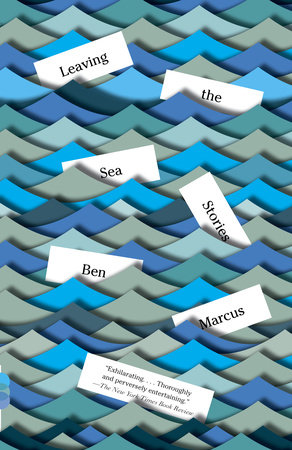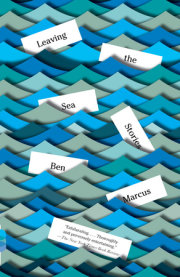I Can Say Many Nice Things
Fleming woke in the dark and his room felt loose, sloshing so badly he gripped the bed. From his window there was nothing but a hallway, and if he craned his neck, a blown lightbulb swung into view, dangling like a piece of spoiled fruit. The room pitched up and down and for a moment he thought he might be sick. The word
hallway must have a nautical name. Why didn’t they supply a glossary for this cruise? Probably they had, in the welcome packet he’d failed to read. A glossary. A history of the boat, which would be referred to as a ship. Sunny biographies of the captain and crew, who had always
dreamed of this life. Lobotomized histories of the islands they’d visit. Who else had sailed this way. Famous suckwads from the past, slicing through this very water on wooden longships.
A welcome packet, the literary genre most likely to succeed in the new millennium. Why not read about a community you don’t belong to, that doesn’t actually exist, a captain and crew who are, in reality, if that isn’t too much of a downer on your vacation, as indifferent to each other as the coworkers at an office or bank? Read doctored personal statements from underpaid crew members—because ocean life pays better than money!—who hate their lives but have been forced to buy into the mythology of working on a boat, not a goddamned ship, separated now from loved ones and friends, growing lonelier by the second, even while they wait on you and follow your every order.
And yet, when Fleming thought about it, this welcome packet, fucked up though it was, even though he hadn’t read it, most certainly had more readers than he did. More people, for sure, read this welcome packet than had ever read any of his books or stories. This welcome packet commanded a bigger audience, had more draw, appealed to more people, and, the kicker, understood its cherished readers better than he ever would with his sober, sentimental inventions of domestic lives he’d never lived, unless that was too flattering a description of the literary product he willed onto the page with less and less conviction every time he sat down at his laptop.
Maybe he’d actually learn something about writing if he read the welcome packet. Maybe in his class he should instruct his students not to write short stories but to write welcome packets.
The room spun and he clutched the bed. It would be two straight weeks of this seesawing, punctuated by mind-raping workshop sessions in a conference room, and the occasional blitz of tropical sun if he could stand it. He had planned to get in shape for this trip, just to medicate a minor quadrant of his self-loathing apparatus, but when that hadn’t happened, when instead he had fattened further, he bought new T-shirts, one size larger than last year. He looked okay in them. Not really that bad. He would just make sure not to take one off in public. Even in private, actually, he had cut down on the nudity. These days the shame had followed him indoors.
Would an oceanside room have made much difference? The brochure—which he
had read, so he could fantasize in advance about where he would be sleeping—had called his room a gorgeous interior cabin, as if deep within a cruise ship was the fat, dripping heart you fought toward with your fork, where the treasure and sex and delicious food was hidden, and not just the exiled lodging for hired instructors on boats with a so-called educational component.
He was talking out loud in the darkness. He could do that because he had no wife with him in the bed, no baby in the next room. They stayed home, thank God, even though Erin wanted to come with him, wanted to bring the baby, made a case that it would be so
fun for little Sylvie, even though little Sylvie had not shown an aptitude for fun, or, well, happiness in general. Don’t blame the baby, though! Don’t blame the baby, you monster! He wouldn’t, if he could help it. The baby would be blameless. Cute little thing.
Anyway, if he’d brought them, and paid for them, because their passage was not included in the deal, they’d be going home in the hole, financially.
Don’t let’s go home in the hole, he’d sung, trying to be funny. Erin didn’t laugh, because that wasn’t actually even the line from anything, and that wasn’t how jokes worked. If he went on the cruise alone, he’d calmly argued, strictly to discharge the obligations of his employment, and not to have fun, absolutely not, they wouldn’t be in the hole. Near it, maybe, clawing the surface of the world as their legs were sucked under, but not yet fully in the hole. Erin looked at him with her sharp face and her knife-chopped hair, bangs of razor perfection, chastising eyes and bones—the whole of Erin so fatally sharp that he was silently criticized by her appearance, criticized for more or less every- thing he’d ever done, even things from before he knew her, finally rebuked by the mere sight of her, and she didn’t have to say a word. Now that was power. That was a serious wife. Somehow, or probably because of this, he was still stupidly, weakly in love with her, even if more and more it seemed that he wasn’t fully sanctioned to touch her, a restriction instituted without any discussion he could remember. Perhaps in private she had feverishly quilted a force field around her body, stitching the damn thing by hand, and now it was finally complete. It didn’t hurt to touch the force field, it just made him feel not wholly terrific. Erin seemed to know, anyway, that when they didn’t have the fun she dreamed of it wouldn’t be Sylvie’s fault. You can’t blame everything on a baby. Or maybe even anything.
Yet one day, he figured, years from now, sitting across from each other at a lawyer’s office downtown, if that’s even how these things worked, they would blame whatever came to mind. Babies, houses, jobs, each other, themselves. Or maybe not. Maybe they’d be fine. Hard to say.
So he was alone, with nothing much to account for except, of course, the morning’s reading, the prep, the prep, the prep, and then the fucking horror of holding a class on this ship.
But he was so lucky! This was so great! How amazing to go on a cruise. His colleagues had stood around pretending to be jealous, and he’d held his ground pretending to deserve it, swallowing his dread. He had no choice in the matter. His student evaluations stank and he hadn’t done much university service.
Service being the word for sitting in rooms with profoundly powerless people exercising a kind of hypothetical problem-solving, as if anything they ever said, anywhere, would ever get implemented ever. Really ever. There was a Zen purity to the enterprise. Circular effort, in a vacuum, in outer space. He needed to engage in more of this, and somehow he needed to improve his student evaluations. Wouldn’t this trip be a chance to collect a batch of raves from his little cruise-goers, who would surely be more susceptible to joy, with the sunbathing and cocktailing and theme dancing, and therefore be more likely to pass on that happiness to him?
Or are the happy even more protective of their mood, having finally arrived at bliss, clinging to it and in no way inclined to transfer such riches to the likes of him? Maybe so. But this time he had a strategy. Some old-fashioned hoo-ha from the school of please don’t hate me. He would get his students to praise him by stroking their egos so hard, relentlessly stroking the shit out of every region of their egos, even the heretofore untouched areas of their egos they never knew they had, stroking them down sleek and smooth, that the students would curl up and mewl like stuffed animals with robotic voice boxes, purring and saying gaga and dada and yes, please, give me some more.
Not, you know, that he saw students as beasts or babies or stuffed animals or anything like that. These were real people! Like you and me! They fucking actually existed for real!
Up on deck nothing was happening. It was dark. The ocean, the sky, the ship. Sweet hell, the silence was nice. Whatever waves had gripped them earlier were gone. Everything was still. Not even the waiters were awake. Something was doing in the kitchen, though. A light burned under the door. Powdered eggs were get- ting mixed in water by a big, industrial paddle, maybe. The frozen planks of scored sausages, ridged like washboards, were getting knifed into singles.
He sat by the pool, leaning against the railing, because the deck chairs weren’t out yet. The boat felt steadier now that he was outside. They’d left New York Harbor yesterday, so where were they now? He had no idea how fast they were going, or how you would begin to calculate their whereabouts, and it didn’t really matter. They were on the Atlantic Ocean, which was nuts. They were fucking
at sea, and in a few hours it would be time for the workshop. It was, actually, pretty great. Surrounded by dark space and dark water and nothing real. A fairly delicious portion of wind pumping off the sea at the perfect temperature. He wanted to thank someone for that and say, Nice going. You nailed it. Perfect use of wind in this setting. My compliments. Erin would, of course, really love it here, on her way to the islands, the occasional dirty coast threatening in the distance. Hot, salty air in the afternoon, stinging her sunburn. She’d be out on the deck early—not this early—swimming laps before the kids took over the pool with their savage games. The bashing, the mayhem, the vampire aggression. Even little Sylvie, if you could keep the fast-crawling gal on a leash so she wouldn’t splash overboard and disappear forever, even Sylvie, his daughter, wrapped in so much flotation she’d look like a life raft, would very certainly, if he had only let her come, have had lots and lots and lots of fun on this boat.
He was supposed to have ten students but he only counted nine. Nine of them leaning forward on the conference table, staring at him, waiting. When he looked in his briefcase for the roster, the one document he actually needed, he couldn’t find it.
Probably it was in there. He had to pee. The room lacked a clock. His chair was no good, and somehow he was sitting at the seam between two crooked tables, which called for awkward pedaling with his legs, and that didn’t bode well. Already he’d sweated through his T-shirt into the button-down he thought he should wear. Everyone waited. They weren’t dressed up. His glasses were smudged. The students wore bright shirts made of parachute material. Cruise clothes. Was this even the right class?
Fuck it. This would get worked out. He said hello and welcome, making the obligatory referential comment about how ridiculously
weird it was to be studying writing on a cruise ship, of all places, which no one laughed or smiled at or even acknowledged facially. Perhaps they didn’t know they were at sea. Was there a certain percentage of people at sea who lacked the knowledge that they were at sea?
Really, anyway, Fleming insisted to them, location shouldn’t matter, because this was serious work they were doing, and this was a serious class, to be done anywhere. If possible, they should, you know, forget about the outside world when they were in here and focus on literature.
Their faces were grave and their eyes, already, seemed to be closing.
So, great. His first lesson to them was to ignore the outside world, which he’d just said had nothing to do with real literature. Splendid advice for writers. And it would be fairly easy to follow inside this airless kill box. This was going very well.
They went around the room and said their names, along with some other data he’d requested—favorite books and writers, past classes taken—which they surrendered with quiet hostility, as if they were corpses who had been fed some rejuvenating pulp that would allow them to release a few more sentences before dying again. You brought me back to life for
this? their bodies seemed to say.
The first story they considered was by Timothy, who had an amazing beard. This didn’t disguise the fact that he was no older than twenty-two. Even if it had been a white beard, even had he walked with a cane and maybe pushed along an IV bag on a gurney—like a child playing an old person in the theater— this boy would look young. Yet somehow he had raised a beard of Bunyan density, and the sight of it reproached anything facial Fleming, maybe thirty years the boy’s senior, had ever attempted.
In Timothy’s story an old man sat on a bed and thought back on his life, which featured some activities he regretted, which he would now tell us about in great length. The end.
A woman named Shay started the critique. She shrugged, said she had trouble believing it, and then paused, failing to elaborate.
That did rather sum things up, Fleming thought. Sort of a brave piece of thinking. Maybe true of almost everything created ever: paintings, books, houses, bridges, certain people. None of them are finally believable, when you really think about it. But, well, there they are. Whole schools of philosophy had fought with that one. Looking at Shay, and the confidence she projected, it was clear that belief was her holy grail and she probably rarely found it. She didn’t believe
this, she didn’t believe that, it was all so unbelievable. Many years from now Shay would be dying somewhere nonspecific—Fleming’s imagination couldn’t piece together a good deathbed location—and she would declare that she couldn’t believe it.
Did Shay want to suggest anything Timothy could do to make his story more believable? Fleming asked.
“No. I don’t believe in meddling with other people’s art. No way. And I don’t want anyone to meddle with mine.”
Well put, and good on you, he thought, but then
what the fuck are you doing here?
He almost said, Okay, so what do other people think of that? The classic workshop whirlpool everyone might happily drown in for a while. Let’s all go down together! But he stopped himself, because that would be like asking, Who else thinks that we have no purpose here? And even if he verged toward the affirmative himself, he’d better pull this ship back to dock pretty fast.
How come a ship metaphor, when actually on board a ship, seemed embarrassing, even when kept to himself, whereas on land it was perfectly acceptable?
Relying on experience, Fleming waited. It was about the only trick he had when he was in the gladiator pit. Ride out the silence. Stare the fuckers down. Someone else in the room was likely to find the pause unbearable before he did. And, sure enough, up stepped Timothy’s defender, Rory. Cheerful, permissive, simple, friendly, handsome, healthy, well adjusted, insane: someone who should never have become a writer.
Rory thought the story was great. So great! That man, on that bed. Wow. Rory could just see and feel him there. The whole thing was so real and he wouldn’t change a thing. This was perfect stuff. It almost could have been a movie! Rory smiled, and it was clear that no one had ever disagreed with him, ever. Or, more likely, people
had disagreed with Rory but he wasn’t aware of it. The bliss it must be to be Rory.
So the poles had been set, approval and dismissal of Timothy’s story, and now it was Fleming’s duty to string critical latticework between them, ricocheting between praise and criticism until everyone had gotten their money’s worth. Later, Timothy could pick from this web of provocative suggestion as he got going with his revision.
Slowly the workshop roles emerged. There were the miniaturists, who wanted to look at a certain line on page 5 and wonder if maybe it shouldn’t be airlifted earlier, which might seismically alter the story and bring the whole thing scarily to life. Mightn’t it? There was the person who said that the story really began halfway down page 2. Apparently these people were everywhere, even on boats. The
your story starts here people. What about saying that the story begins right after it ends, right here, on a page you haven’t written yet, and then throw a balled-up piece of paper at the writer? There was a young woman named Britt who felt the story should be switched from first person to third. First person, to her, at least in this story, allowed confessional overtones that seemed to let too much self-pity creep into the story, which defeated a reader’s ability to care for this man. If he feels sorry for himself, she explained, it makes it harder for us to. Not bad, Britt, Fleming thought, keeping his face neutral. A strange dose of reason on the high seas. But her comment was ignored and then there was the person who confessed that this story really wasn’t his thing so it wasn’t even fair for him to try to evaluate it. He’d better pass. He wanted to pose this response as an apology, like saying he was sorry, he didn’t read French, so what could he do? I’m sorry, man, your shit isn’t my thing.
Ah, one of those guys. The one from last semester had been named Sean. This one, the cruise version, was Carl. Exempted from value exchanges because of his immensely idiosyncratic place in this world. Not really
his world, just a world he is grumpily visiting. That’s what Carl should have said: I’m sorry, I have to pass, I’m not actually a human being. Whatever Carl’s real
thing was would be a closely guarded secret until he turned in his own story, and everyone—or so it usually went—once they saw it, would strain to detect the slightest difference between Carl’s writing and the work of the peers he’d spent so much effort distancing himself from.
Fleming jumped into the discussion and said that Timothy was brave to write about something so distant from his life, and for this he should be commended. Brave or silly, though, he wondered? Often it was hard to know the difference. To the students he said this was powerful material. A man who will die soon, wondering what went wrong in his life. And he’s alone. His mistakes have left him alone. He’s done this to himself, it’s his fault, there’s no one else to blame, and yet we somehow,
potentially, feel for him. It’s really tragic. Cheers, really, to Timothy, because this stuff is big. But could the story maybe, who knows, use a scene? Sometimes an actual scene carries feeling really well, at least if that’s the goal here? Possibly not. Possibly not. Expository narrative can be really, important pause, interesting. Can anyone think of examples of this?
Of course they couldn’t, and he panicked, because suddenly he couldn’t, either, even though he’d once taught a whole class on the subject, “Tell Don’t Show,” one of those kill-the-father courses that resulted in a literary body count of zero. But no one seemed to care. They didn’t want examples. The era of illustrating a point was long gone, which made teaching easier, if lonelier. Years ago Fleming would tackle a discussion to a halt, to recommend books, even while his students would look suddenly unplugged, drained of life, because Fleming hadn’t just changed the subject, he’d made them forget their names and why they were there. He would describe the plots of these books, their styles, their techniques, why they were important, and no one ever made a note, even to write down an author’s name. They would blink at him, waiting for his seizure to flare out. In his evaluations, Fleming would learn that students viewed these endorsements not as the kind of resource sharing that universities were meant to enable, but as digressions, beside the point.
Stalling, one student called it. And so instead he talked and talked and talked about Timothy’s story itself, devoting more language to it than it contained, a body of criticism outweighing a work that would never be published, trying to praise Timothy without alienating his classmates, most of whom sensed that the story was muted and unreal, an exercise. But Timothy couldn’t be shut down here, Fleming knew. He needed to be encouraged. Get the young man on his back, lift up his shirt, and rub that fucking belly. And yet at the same time Timothy’s classmates could not think their teacher was an idiot pushover who simply praised whatever he read, particularly writing like this, because then what was his praise worth if it ever actually came their way?
Fleming danced the tightrope, throwing coins to each side of the line. If Timothy did not actually purr out loud, at least he seemed content. Fleming’s neutrality in the end must have only made him seem spineless. A politician of the classroom, pleasing precisely fucking no one.
There was time at the end for Timothy to ask questions, and he just thanked everyone. He really appreciated it, nodding through that wondrous beard, rubbing his hands together.
“No questions? That’s it?” Fleming asked.
“I mean, yeah,” said Timothy, sitting back, pleased. “I wrote that story in like two hours so I’m surprised anyone liked it at all.” (Continued….)
Copyright © 2014 by Ben Marcus. All rights reserved. No part of this excerpt may be reproduced or reprinted without permission in writing from the publisher.
































































































